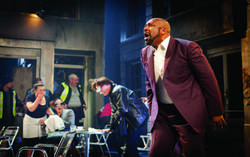William Shakespeare’s The Comedy of Errors, starring British comedian Lenny Henry, was performed at Royal National Theatre in London, England last Thursday with National Theatre Live broadcasting the performance across the world at 700 cinemas in 22 countires, including Pollak Theatre.
Alyssa Caporaso, a sophomore and an employee at Pollak Theatre, was attending the event for a theatre appreciation class and helping to collect sign-in sheets for the classes. She had high hopes for tonight’s production as she heard it was “very funny.”
“The shows are very cool,” said Caporaso. “[At] these kinds of events you will see a lot of people come out because obviously they’re all students. And Monmouth offers a lot of great programs.”
The play begins with Egeon (Joseph Mydell), a merchant of Syracuse imprisoned by Solinus (Ian Burfield), the Duke of Ephesus, for being in the city illegally and is to be executed unless he comes up with a thousand marks. Egeon begs for mercy as he tells a tragic tale of his wife giving birth to twins and buys a set of twins to “attend” to his sons. The family then set sail back home but the ship was destroyed, splitting the family apart.
Now Egeon’s son, Antipholus of Syracuse (Lenny Henry), is all grown up and goes out in search for his twin brother and mother along with his servant Dromio (Lucian Msamati). Egeon is worried he’ll lose his whole family, embarking on his own quest until he is captured. Duke sympathizes with Egeon, granting him one more day to find his son and come up with the fine or be killed.
After this sad but hopeful story, the errors and comedy begin immediately as Antipholus and Dromio arrive in Ephesus. Dromio is sent off to deposit some money as Antipholus considers how to spend his time, just as Dromio walks on stage sooner than expected. Yet, it’s not Dromio of Syracuse but his long lost twin brother, Dromio of Ephesus (Daniel Poyser) who works for Antipholus’s twin brother, wanting who he thinks is his master to return home to his suspicious wife.
Confused? So were all the characters involved as Dromio of Ephesus is beaten for joking about Antipholus having a wife. When Adriana (Claudie Blakley), wife of Antipholus of Ephesus, and her sister Luciana (Michelle Terry) hear about Antipholus’s denial of being married, they send Dromio back to find his master as the sisters also go on a hunt for Adriana’s husband.
The sisters find Antipholus and Dromio of Syracuse in a pool hall. Adriana pleads with who she thinks is her husband to come home while flaunting her good looks and seducing Antipholus and the rest of the cast. Antipholus and Dromio can’t shake them off and think women from Ephesus practice witchcraft. They reluctantly agree to go home with them while snapping their fingers for superstitions. Soon after, the audience meets Antipholus of Ephesus (Chris Jarman) who is locked out of his home and leaves in a huff to sleep with another woman to get back at his wife.
What really brings this production to life is the endless energy each of the characters exudes. Both Dromios are beaten excessively by either their master or master’s twin, continually jumping and running around stage. The sisters trump around in their high heels like “The Real Housewives of Epheseus” and command just as much attention as they yell at the top of their lungs. Then there’s the Antipholuses, both constantly caught in confusion of what’s going on as their anger is stretched throughout the show. They scream at their servants and are chased by a mob, but have no problem laughing at their unexpected fortune or smiling at their love.
Freshman Norman Ryan, who was also at the event for a theatre appreciation class, had a hard time deciphering what the actors were saying due to the language, but he was still laughing at the things they did. “I can follow what they’re doing,” Ryan said. “She’s [Adriana] jumping on tables and he’s [Antipholus of Syracuse] getting on one knee, so I can understand that.”
Live theatre is all about making the cue and hitting the mark, and the cast did both masterfully well. When a maid throws water off a balcony below, a merchant is strategically placed. While the slapstick humor seemed easy to perform, each time one of the Dromios was beat by an Antipholus with either rope, a dinner plate or pool cue, it was only because the actors were nicely directed by Dominic Cooke and fight director Kate Waters.
In between scenes, set pieces were swiftly changed with the help of a moveable stage that gave the setting of a vibrant city. While the sets were being changed, a group of musicians acting as a street band performed songs that went well with the previous scene, like “Iron Man” by Black Sabbath, as the sisters first set out on their search for Antipholus under the impression he’s cheating. “Crazy” by Gnarls Barkley is heard after Antipholus and Dromio of Syracuse think the sisters are witches. Egeon and Solinus are shown briefly through these set changes as Egeon searches for money and his family.
While this is one of Shakespeare’s first plays and intended for audiences during the Middle Ages, director Cooke transcends the work to modern times very well that all audiences can enjoy. When Adriana acts like an animal while being intimate with her husband’s twin, the crowd howls in laughter in Pollak Theatre and Royal National Theatre. Gross humor was sparingly used like the Dromio brothers exchanging flatulence through an intercom, but kept all audience members laughing.
“I loved the play, I’ve never seen it or read it before,” said Anne Cannon, of Ocean Township. “I come to Pollak all the time, especially for the operas. I think it’s wonderful here.”
PHOTO COURTESY of sketchesontheatre.blogspot.com


